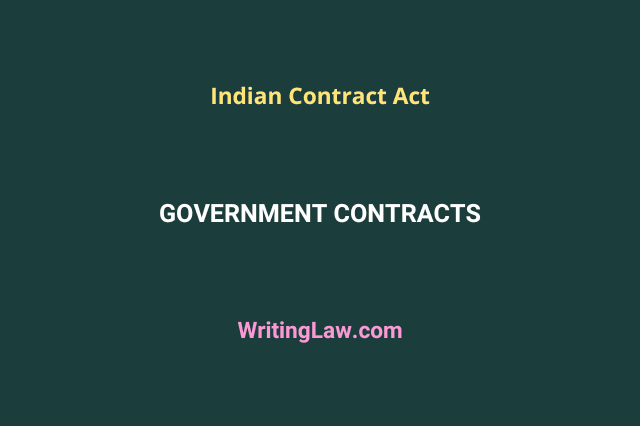
A contract is an agreement which is made between two parties with free consent, and both parties agree to do something or abstain from doing something in return for some consideration. Section 2(h) of the Indian Contract Act defines a contract as an agreement which is enforceable by law.
Government contracts are those contracts in which one of the parties is either state or the central government. That’s why all government contracts are made in the name of the President or the Governor in the case of the central and state government, respectively.
In this article, you will read about the constitutional provisions of government contracts, their role as quasi-contracts, and their benefits.
Constitutional Provisions of Government Contracts
Along with the requirements given under the Indian Contract Act of 1872, for a contract to be enforceable, government contracts need to fulfil the provisions for its formation laid under Article 299 of the Indian Constitution. It says that if the contract is not made under the name of the President or the Governor, the contract will not be considered a government contract.
Clause (2) of Article 299 of the Indian Constitution immunes the President and the Governor from being held personally liable for any damage caused due to the signed contract. This is because they have only signed the contract on behalf of the state, but they themselves do not perform it.
But it does not mean that governments cannot be held liable for the misconduct, breach of contracts, or damages caused on their part. If any damages are caused due to the government’s misconduct, the other party can sue the government and claim the damages.
Clause (2) of Article 299 of the Indian Constitution says that:
“Neither the President nor the Governor shall be personally liable in respect of any contract or assurance made or executed for the purposes of this Constitution, or for the purposes of any enactment relating to the Government of India heretofore in force, nor shall any person making or executing any such contract or assurance on behalf of any of them be personally liable in respect thereof.”
We already know that contracts can be made expressly or impliedly, but according to the provision of Article 299 of the Indian Constitution, the government contracts can only be made expressly, i.e., in a formal written document. This is done to ensure that no one tries to defraud the government with fake contracts. If implied contracts are made with the government, the same would not be enforced by the law.
Since the government enter into so many petty contracts, which might not be possible to maintain a written document of, then clause (1) of Article 299 of the Indian Constitution comes into the picture. It gives the flexibility that even if all the other provisions of the Article are not fulfilled but suffices clause (1) of Article 299, still, the contract would be enforceable.
Clause (1) of Article 299 of the Indian Constitution says that:
“All contracts made in the exercise of the executive power of the Union or a state shall be expressed to be made by the President, or by the Governor of the state, as the case may be, and all such contracts and all assurances of property made in the exercise of that power shall be executed on behalf of the President or the Governor by such persons and in such manner as he may direct or authorise.”
Government Contracts as Quasi-Contracts
Moreover, government contracts also come under quasi-contracts.
Section 70 of the Indian Contract defines quasi-contract. It says that:
“Where a person lawfully does anything for another person, or delivers anything to him, not intending to do so gratuitously, and such other person enjoys the benefit thereof, the latter is bound to make compensation to the former in respect of, or to restore, the thing so done or delivered.”
The benefit of applying the rules of quasi-contract in government contracts is to protect the government and the contracting party from being exploited for undue benefits. It also says to restore any benefits derived from the contract back to the owner of it.
The government also has the power to recover any advantage given by it to the other party in the case of void agreements, as enshrined under section 65 of the Indian Contract Act. It says that:
“When an agreement is discovered to be void, or when a contract becomes void, any person who has received any advantage under such agreement or contract is bound to restore it, or to make compensation for it to the person from whom he received it.”
Benefits of Government Contracts
The need for government contracts is to make the functioning of the state smoother and more accountable. Government comes into contract with so many national and international parties for the development of the nation, so it becomes necessary to have a contract in the name of the government rather than any specific person.
Read Next:
1. What Is a Contract of Guarantee in Contract Act
2. What Is the Contract of Indemnity in Contract Act
3. 5 Kinds of Contracts Defined With Easy Examples and Differences
- What Does “Justice Delayed Is Justice Denied” Mean? - 28th April 2023
- What Is Volenti Non-Fit Injuria Under the Law of Torts? - 25th April 2023
- What Are the Differences Between Possession and Custody? - 24th April 2023







